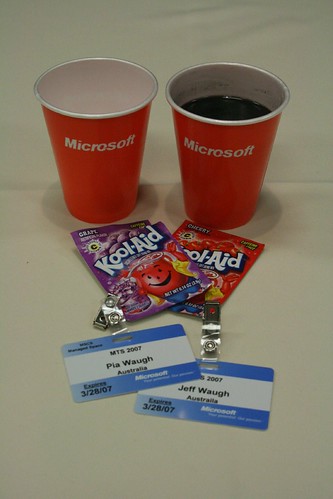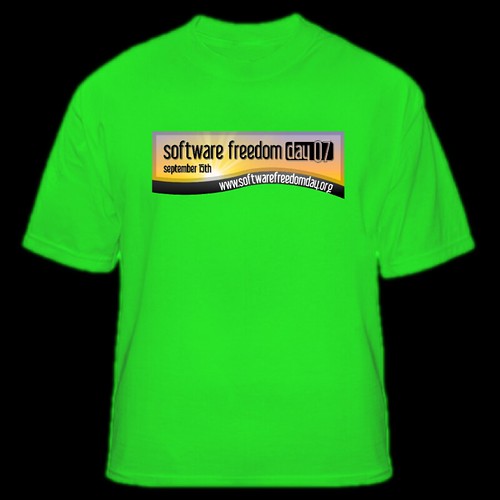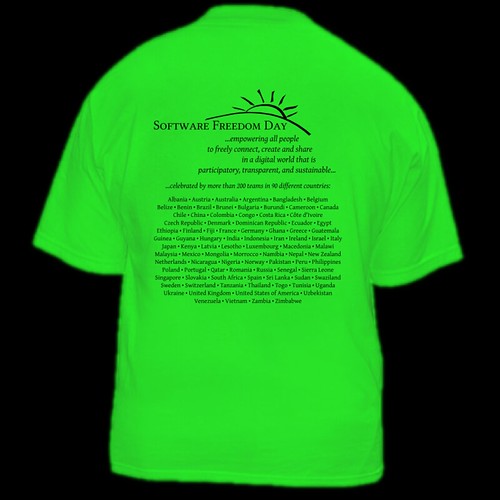A good friend of mine and very cool chick Maureen O’Sullivan is giving a talk at UNSW hosted by the Unlocking IP crew next Wednesday. Details are all here so come along if you can 🙂 She is a great speaker and has some pretty interesting ideas about copyright, IP & FOSS. Thanks to the housemates at the Unlocking IP house of commons for putting it on 🙂
Category: FOSS
Software Freedom Day online shop is up!
I’ve been working on putting up the online Software Freedom Day shop, which at this point includes tshirts for the event and CD packs of The Open CD. Teams running SFD events (that register prior to the 31st July) get a 50% discount so spread the word! 🙂
We also have more and better free schwag for teams than ever before including balloons, CDs, shirts, stickers and more. We also have more sponsors than ever before but more on than soon 🙂
We already have 125 teams registered from all around the world and it is only July! This year is looking to be huge!
More information soon to come 🙂 Comments on the shirt design are welcome.
Software Freedom Day 2007 – 83 teams registered!
It is almost 3 months away from Software Freedom Day 2007, and we already have 83 teams registered! This year a lot of work went into the new registration system to make it easier for teams and for everyone else to find information, see all the teams, and get a feeling for what a truly global and participatory event this is. Check out which continents all the teams are from, it is fairly evenly balanced. As usual, Australia is doing well with 10 teams already registered!
Teams that want special SFD goodies including CDs, shirts, stickers and balloons need to be registered by the 31st July, so get in soon and register your team. Last year we had about 200 teams all up (including all the ones that registered after the free goodies date had passed), so we hope to have 300 teams this year!
The new Software Freedom International Board which includes 3 top SFD team leaders from 2006 is totally awesome, being extremely active, enthusiastic and full of new ideas.
Rock on and remember, freedom isn’t just for geeks, so let’s all get out there and help spread the important ideas of software freedom. I’ve got a short “About Software Freedom” page for anyone interested.
The New Zealand Open Source Awards!
Don Christie of Catalyst in New Zealand has asked me to be on the panel of judges for the New Zealand Open Source Awards, which is pretty exciting!
This looks like a great initiative, and certainly something we should look at doing here too. Jeff has already made the suggestion, so lets make it happen!
Rock on New Zealand!
Openness – how open is FLOSS?
Having spent a long time in the FLOSS world both in community and industry roles, I started to see a serious disconnect between the industry and community perspectives on FLOSS about 5 years ago. I mean a disconnect that went beyond philosophical and into the practical, and this is largely because is a rapidly expanding userbase and industry around FLOSS. Community participants in FLOSS have a different understanding and expectation of openness than people in industry, and this difference is unfortunately being used to undermine the core values that make FLOSS more than just another technology set. The issue is that for all the well meaning of the 4 freedoms of the FSF or the Open Source Definition of the OSI, people can simply take those licences and not subscribe to any of the other attributes of openness that are expected of a FLOSS project and still get the good name of being a FLOSS project.
Openness has been proven time and time again to be the way forward. We saw it with TCP/IP, with HTTP, and now with FLOSS projects like Apache. Openness provides a platform for innovation, collaboration, an open and competitive market, and a sustainable approach to a digital future. In the same vein, a more closed approach may in some cases also be appropriate. For instance some popular and successful FLOSS projects have relatively closed development models controlled by an individual or a single company. An understanding of the degree of openness in software helps people understand the implications of the software model and also the implications in using the software.
In the spirit of discovering the core principles of openness, Jeff and I spent some time working on a model to help explain openness in such a way that it couldn’t not be undermined. We came up with 5 Foundations of Open:
- Open Source – the conditions surrounding the project source code. Usually defined within the licence terms.
- Open Standards – the data, communication and other standards used within a project, for example, APIs, protocols, & documentation norms.
- Open Knowledge – the documentation, project information, decision making, communication archives and any other content related to the project.
- Open Governance – the structure of the organisation that defines who participates in a project and the terms of participation. Includes decision making, and any practical or policy limitations on participation.
- Open Marketplace – the ability for any organisation to build a business around a project. Includes practical, legal and technological limitations to building an open marketplace around the project.
As we can see, above is a far broader understanding of openness than is generally subscribed to. A project may decide to have a more closed approach to any of these 5 vectors, and sometimes for good reasons, however by looking at all software (not just FLOSS) using these vectors people will be able to have a good understanding of how open the software is and what that means for using it, developing on it, building a business around it and so on and so forth.
I’m currently building some metrics around this to help determine the openness of any software, and will announce here when it is done.
Edit: This is an idea Jeff and I have worked on for some time, so I can’t take all the credit 🙂 Thank you Jeff!
OLPC on the ABC – with Quozl :)
Check out this interview with James Cameron about the OLPC by the ABC. Nicely done! 🙂
Open CeBIT business conference – special price
The Open Source business conference, a major part of the Open CeBIT expo and conference at CeBIT this year is looking great. With Simon Phipps from Sun, Mary Ann Fisher fro IBM, great local implementation case studies and loads more. Anyway, they’ve just announced a special $199 ticket so if you are thinking of going, register ASAP as the price is only available this week. I totally recommend this for anyone interested in the business applicability of FOSS, whether they be potential users, developers of or companies building a business around FOSS. To register simply call +61 2 9280 3400. See you there!
GPL3 conference video online
The GPL3 conference held at UNSW in November is now available online. Thanks Unlocking IP team and nicely done providing an Ogg Vorbis download 😉
Microsoft and Open Source – the inside story
A couple of weeks ago Jeff and I had a very interesting experience. We were invited to the 2007 Microsoft Technology Summit at Redmond. It was a small event with about 50 or 60 people from all walks of technology, and I think about 1/3 of the attendees had been invited due to their understanding on Open Source, so there were some familiar faces. Jeff and I were certainly curious to get inside Microsoft and talk to the technical people working with Open Source there.
Firstly it must be said that Microsoft are excellent hosts. They paid for our accommodation, flights, travel and all meals. They looked after us very well and it was a very pleasant trip. We even got some sunshine in Seattle, so thank you to Charles Sterling who invited us, and Nigel Watson who arranged all our travel. Both are Microsoft developer evangelists and great guys.
The summit consisted of talks by Microsoft people, including Bill Hilf and Sam Ramji. Sam runs the Open Source lab, and Bill is General Manager of Platform Strategy, started the Open Source lab and now also runs the Get the Facts campaign. There were other talks about SOA, IE7, Xbox, PowerShell and a whole bunch of stuff which was largely unrelated to our work. The talks were interesting, particularly as I haven’t really been involved deeply in Microsoft technologies for a few years, however I also spent some time in discussions unrelated to the agenda.
Some of the talks would start with Microsoft technology and then at the very end say “by the way, here is how it is better than (insert Open Source equivalent)”, which seemed a little patronising. I guess they were trying to change out minds. This was most evident in the IIS talk where at the very end the guy started seriously bagging out Apache, much to the amusement of several attendees who debated his opinion.
Bill Hilf had been talked up by several notable Open Source characters, including Tridge, however his talk (which launched the Summit) was very disappointing. It was arrogant, limited, and appeared to miss the larger picture of Open Source. He talked about how they are focused on Open Source only as a development model and business model, which would be fair enough, however he went to to rant about how he is not running a “jihad”, that Open Source is “writing and licensing software. That’s it. It isn’t freedom, it isn’t a movement”, and how he’s just here to sell licences. I questioned Bill and Sam on the sustainability of a strategy only seeing Open Source as a mechanism for driving licence revenue, as every successful company building revenue around Open Source has multiple revenue models and usually a strong services approach.

Bill’s been drinking the Kool Aid…
Sam strongly debated whether it was even possible to build a sustainable business on Open Source. Unfortunately he just didn’t seem to understand that there is already an entire industry built around Open Source that is doing very well. He used Oracle as an example of the problem. He thought it preposterous that Oracle would take RHEL, build services around it and sell those services even though they didn’t build the product. However, this is explicitly allowed under many of the Open Source licences we use, which is understood to drive an open market competing on value rather than locked down to a single supply chain.
When asked about standards Bill said that Microsoft are not interested in pushing a standard, but rather selling a product. Bill and the other Open Source people in Microsoft referred often to Open Source being used as a technology weapon by competitors such as IBM, which I guess is in many ways true, however I think they’ve let this opinion interfere with their ability to see beyond that and to why people are starting to care about Open Standards. When asked why they don’t just support ODF, Bill made some comments about how it wasn’t as easy as that and it isn’t just a standard but a whole product. The ensuing discussion driven by the Malaysian guys who are strong Open Standards proponents was almost comical as Bill simply didn’t answer their questions usefully. Sam said that it was likely MS Office would eventually support ODF as the market demands it.
Sam and Bill both also made the unfortunate mistake of painting any Open Source people who didn’t comply exactly with their views as fanatics and extreme, which isn’t a great way to endear them to the community. I had to really sit Sam down and say every time you compare the vast majority of Open Source people to fanatics, you are only making it harder for yourself to successfully participate. He was, to his credit, open to constructive criticism. I can understand his position being in between a rock (Microsoft) and a hard place (the community), however I think for him to succeed he and his team really need to keep grounded through keeping in touch with the community.
I also noticed most of the Microsoft people who mentioned Open Source differentiated between Open Source and commercial software, which was very frustrating considering how much Open Source is used, sold and supported commercially. The guys we mentioned this to were open to the issue and said they would try to fix this mistake.
I really think that Microsoft have come a long way from only a few years ago when Open Source was a “cancer”, and the Open Source people did say that every time Steve Ballmer opens his mouth about Open Source it hurts them, so I think they are doing quite a good job. I would strongly encourage them to participate more in the community so they can keep an open mind to Open Source beyond the Microsoft party line. Also I think unless Microsoft can see that there is value to Open Source beyond the development model, then they are severely limiting their understanding and missing the bigger values of Open Source economically and socially. There is certainly value to an Open Source approach when it comes to trustworthy systems through transparency (for example in electronic election systems, where access to the source code is really important to a trusted system) and sustainability through Open Standards. An open platform and approach drives innovation, competition, value and ultimately more freedom down the line. Unfortunately for them, Microsoft either doesn’t understand or doesn’t want to understand this.
Microsoft unfortunately regard an Open Standard as something they create inhouse and publish for others to comply to them, and open community as building a new community for other people and projects to join. They haven’t yet appeared to understand that Open Source is about active participation, not about creating yet more silos.
I guess although we found in the Microsoft Open Source labs some knowledge about some Open Source technologies, we were quite disappointed with the limited views held about Open Source, openness and community.
Software freedom isn’t just an idealistic philosophy. It is a commitment to technology openness and freedom which is increasingly important when so much of our lives is based on and possibly limited by the technologies we use to vote, communicate, create, share and work. Luckily this is becoming more understood by the general population. People like Cory Doctorow are driving the charge on protecting consumer rights when it comes to a digital age. Companies like Microsoft can choose to embrace a more open approach, one that will maintain the rights of software users and developers rather than locking them in to proprietary data formats, DRM, vendor lock-in or worse. Or they can choose to be left behind.
Other blogs and interviews on the event from other OSS people:
- Dinesh Nair on Day 1 of the Summit
- Yusseri Yusoff on Day 2 of the Summit
- Ben Galbraith did extensive coverage on the Summit (just look at all the MST07 posts in March), including of Sam Ramji’s talk, the head of the Open Source lab in Microsoft.
- Michael Koziarski – Ruby developer
- Interview with Samir Chopra with links to his work. With a blog site called Decoding Liberation, this guy is very cool and really gets FOSS. He has a book coming out soon and is worth chatting to.
- Old blog post from a previous summit from Jono Bacon
Links of interest:
- Port 25 – a community project by Microsoft about Open Source run by the Microsoft Open Source lab crew.
Pia goes very Warhol
I think I’ve mentioned Elizabeth Gordon Werner before, the FOSS in Government advocate and aspiring artist. Well, she’s doing a series of FOSS art, and the latest looks and sounds a bit familiar 😉


Nicely done Elizabeth! There are more iterations of the same idea here.

